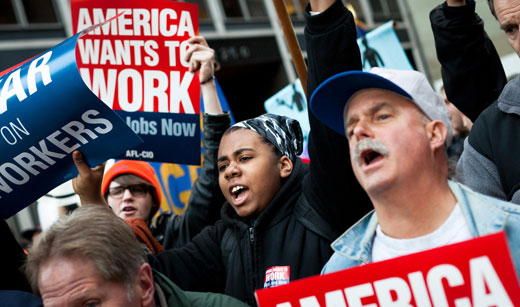
WASHINGTON – Union leaders view positively the emphasis President Obama put on economic themes in his State of the Union address, particularly his call for the wealthy to pay their fair share in taxes while payroll taxes on the middle class do not rise.
The leaders also blasted the Republicans – both the party’s presidential hopefuls and its congressional controllers – for blocking needed legislation , proposed by Obama and backed by labor, to put the U.S. back to work as high unemployment continues.
“Leaders are judged not just by what they say but to whom they listen,” AFL-CIO President Richard Trumka said after Obama’s Jan. 24 speech. The president “listened to the single mom working two jobs to get by, to the out-of-work construction worker, to the retired factory worker, to the student serving coffee to help pay for college.
“By laying out a vision of an America that can create jobs and prosperity for all instead of wealth for the few, the president voiced the aspirations and concerns of those who are too often ignored.
“And he made clear the era of the one percent getting rich by looting the economy, rather than creating jobs, is over,” Trumka added. “What a contrast to the vision presented by presidential candidates squabbling over how much further to cut the taxes of the one percent,” the AFL-CIO leader said, referring to GOP presidential hopefuls Mitt Romney, Rick Santorum, Newt Gingrich, and Ron Paul, though not by name.
Obama “insisted on a more humble Wall Street subject to a thorough investigation of the misconduct in the mortgage markets that wrecked our economy by the full range of federal and state civil and criminal authorities. We applaud creation of a new mortgage crisis unit” for such probes, Trumka said. He also demanded Congress get out of the way of preventing economic recovery. Other comments included:
Steelworkers President Leo Gerard said his union supports Obama’s demands for higher taxes on the rich, trade enforcement-especially against China-and revitalizing U.S. manufacturing. The Steelworkers, he added, “are ready to go to work,” with the administration for those goals. Gerard, too, contrasted Obama’s proposals positively, compared to those from the GOP hopefuls.
Obama “laid out a vision of the America we want and need, one that creates jobs and prosperity for us and not the one percent who have looted the economy,” Gerard said. “Strengthening manufacturing by looking to build good jobs, green jobs, and sustainable jobs with American energy, skills, and values is a program for us.
“The president’s commitment to discourage job outsourcing and promote insourcing is a ticket to a better economy…but the president cannot do this alone. Congress must immediately act on a massive scale to pass legislation, starting with a major investment in infrastructure. Congress should also approve pro-American manufacturing tax incentives or innovation, insourcing, training, and domestic capital investments, plus renewable energy to support American jobs.
“American workers and middle class families will respond to his saying that everyone must play by the same set of rules and pay their fair share under the ‘Buffett Rule.’ Millionaires and billionaires should pay at least the same tax rate as their office secretary. The president’s record and blueprint are a stark contrast to the Republicans’ campaign of obstruction that denies the right of workers to collective bargaining in the private and public sectors,” Gerard stated.
Amalgamated Transit Union President Larry Hanley applauded Obama’s “call to build an equitable economy” rather than what the U.S. has become: “A nation of two classes-the small cadre of the super rich and the rest of us, bus drivers, restaurant workers, telecom workers, fire fighters, and working families who have been victims of and taken the blame for this recession.
“It’s time for Republican leaders in Congress to get serious about shared sacrifice in our nation by requiring the richest one percent to pay their fair share of taxes,” he said.
Hanley also cited Obama’s jobs-creation call-and said one key way to increase jobs is to finally pass a mass transit-highway construction law. “Few things can do more to help our economy dig out of this deep recession than investing in public transportation,” he said. “The federal transit program that ensures accessible and affordable mass transit to safely get to and from work, school, the doctor and other important daily tasks. It creates good jobs, delivers customers to businesses, and helps clear the air. There is literally nothing more effective in getting our economy moving.”
American federation of State, County and Municipal Employees President Gerald McEntee focused on the congressional obstructionists who block Obama’s proposals. Doing so, he said, has already hampered the recovery from the Great Recession.
“The choices Congress makes in 2012 will determine whether we save the middle class,” warned McEntee. “We can do that by enacting Obama’s jobs agenda. Or we can focus on misguided policies that do nothing but give more tax breaks to Wall Street financiers and transfer even more wealth to those at the top of the economic ladder. This nation cannot continue to be held hostage by corporate-backed politicians who have rejected every meaningful jobs plan. Their reckless games harmed the recovery and cost us our credit rating-all because they care more about political games than creating jobs…It’s time for Congress to stop their games and get to work. It’s time to enact the president’s agenda for jobs.”
American Federation of Teachers President Randi Weingarten was one of the few union leaders to concentrate solely on Obama’s discussion of her union’s issues. Obama devoted a short section of his speech to education.
Obama “made clear what teachers have long understood: We can’t test our way to a middle class; we must educate our way to a middle class,” she said. “The overemphasis on testing has led to narrowing of the curriculum, rather than creating a path to critical thinking and problem solving. These are the kinds of knowledge and skills our children need to compete in the global economy,” she added.
“Respecting public school teachers and providing them with the tools and resources they need to help our children learn and grow are essential to building a strong public education system, competing in a global economy, and restoring economic opportunity for all,” said Weingarten.
The Communications Workers of America liked Obama’s plans to raise taxes on firms that outsource jobs. “It’s critical to bring quality jobs back to the U.S. by eliminating tax benefits for companies that send U.S. jobs overseas,” the union stated. “CWA strongly supports legislation to end taxpayer subsidies for corporations that get tax breaks, then, among other measures, move call center jobs offshore.” It also declared firms “have too much power in writing legislation that rewards corporate interests and abandons U.S. workers, when it comes to manufacturing and services. Too many corporations routinely put short-term profits ahead of loyalty to the nation and workers who made their success possible. An America built to last cannot be one in which corporate money determines…what issues are debated.”
Photo: Union members at a “March for Jobs & Economic Justice,” Dec. 1, 2011, in New York City, John Minchillo/AP












Comments